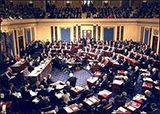
Congress Friday approved legislation that could put an end to furloughs of air traffic controllers and other FAA personnel that have correlated with a spike in commercial flight delays, but the bill may do even more. The legislation would allow the FAA to transfer up to $253 million from other programs to fully staff controller positions though September. The FAA had estimated that its staffing furloughs would save an estimated $200 million and closure of 149 federal contract air traffic control towers would save $50 million. It is not yet clear how the transfer will be applied or what other areas would suffer. The bill was approved by the Senate, Thursday, and by the House, Friday when it awaited the expected approval of the President. As presently applied, flight delays have not been the only problems exacerbated by the cuts.
According to the Professional Aviation Safety Specialists union (PASS), which represents FAA employees, the furloughs imposed on FAA employees through sequestration also led to delays in equipment maintenance. According to PASS, furloughs were already leading to missed or deferred preventive maintenance that resulted in reduced system redundancy and insufficient funding for parts and equipment. Passage of the bill would leave the balance of the $85 billion sequestration cuts in place, but would allow the FAA more flexibility in how those cuts are applied at the agency. The FAA had planned to close 149 federal contract air traffic control towers beginning June 15 to save roughly $50 million. It would appear that a portion of the $253 million transfer allowed under the bill could be applied to keeping those towers open. In either case, it is not clear what other areas of operation would suffer as a result of the transfer of funds.


































